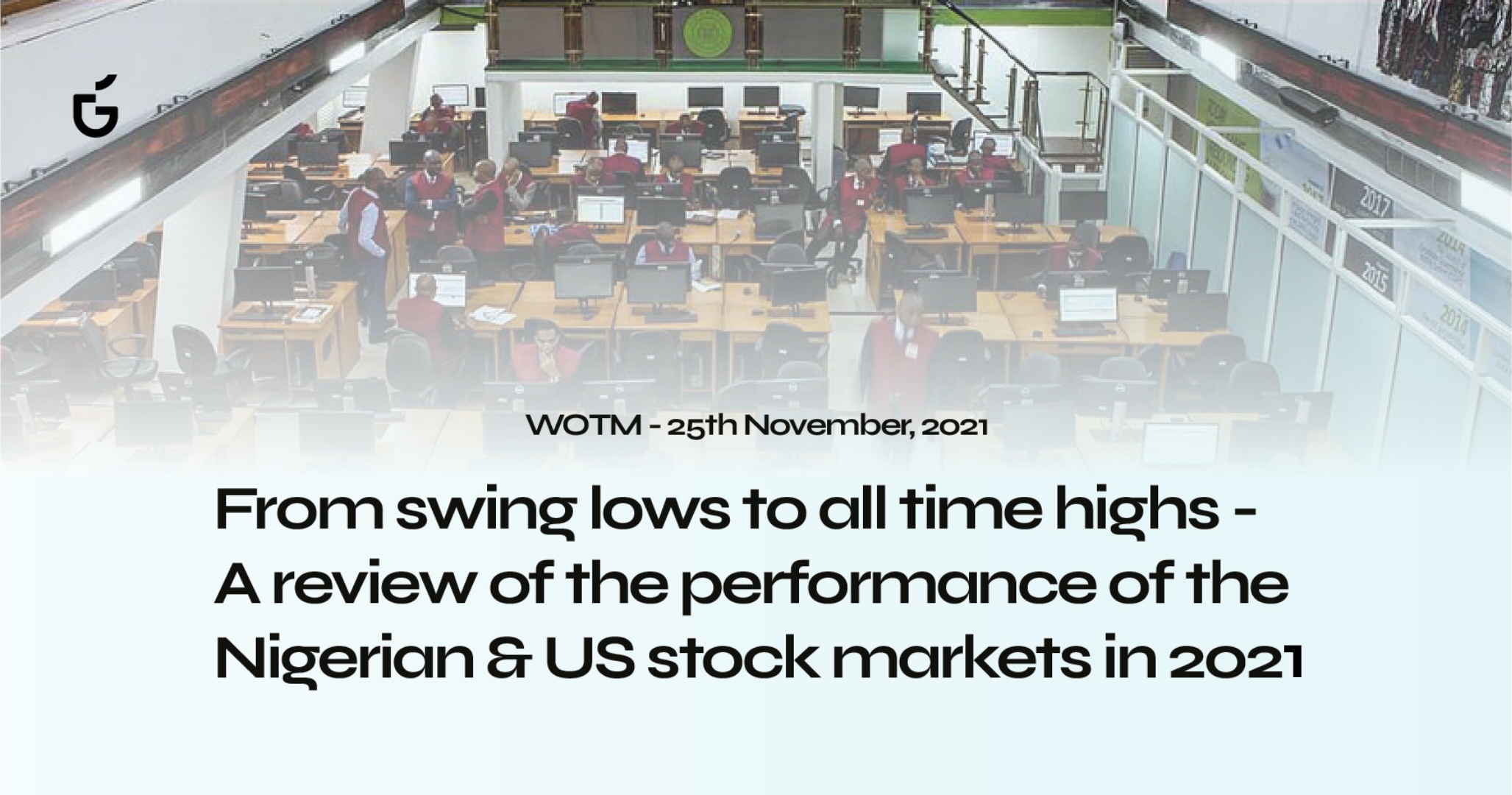 Africa
AfricaUnderstanding how companies are valued – A look into the MainOne acquisition
15 December, 2021
21 July, 2021 | 4 MINS READ
The Story
Richard Branson, billionaire owner of Virgin Galactic on the 11th of July 2021 flew to space on the company’s spaceship for the first time. Richard Branson beat other billionaires (Jeff Bezos & Elon Musk) in the race to space. At the opening of financial markets on the 12th of July 2021, Virgin Galactic filed to sell $500mn worth of shares to investors in a secondary offering. This put the company’s share price in the negative all through the week falling from $49.20 on the 9th of July 2021 to $30.20 on the 16th of July 2021.
Dangote Cement, the most capitalized stock on the Nigerian Exchange Group (NGX) in December 2020 announced its was embarking on a share buyback. According to Dangote Cement, the company will buyback 10% of its total outstanding shares in tranches. The first tranche was completed on the 31st of December 2020 when the company bought back 0.24% of its issued shares. The company’s share price rose from N230 on the 21st of December 2020 (the day the buyback was announced) to N244.90 on the 31st of December 2021.
Explaining Share Dilutions and Buybacks
When a company issues additional shares either by conversion of debt to equities or by a secondary offering like Virgin Galactic, a share dilution has taken place. It is called a share dilution because it increases total issued shares without necessarily increasing the number of shareholders by the same proportion in which issued shares has increased. This decreases the worth of existing shares. To better understand this, let us put numbers to it.
Imagine a company has 10,000 issued shares with 10 shareholders owning 1,000 shares each, giving each shareholder 10% (1,000/10,000) of the company. Should the company decide to increase its total issued shares to 15,000 by converting some of its debt to equities, the shareholding proportion changes. The former debtor now owns 33% (5,000/15,000) of the company, while existing shareholders have their 10% holdings reduced to 6% (1,000/15,000). Share dilution also reduces investors earnings by reducing earnings per share.
A share buyback is the opposite of a share dilution. A share buyback or repurchase is a situation in which a company literarily buys back some of its issued shares from shareholders. Unlike a share dilution, a share buyback reduces the number of shareholders and increases the worth of a company’s shares.
Why Do Companies Dilute/Buyback Shares?
Companies dilute shares when there is a need to convert some existing debt to equities. In cases where companies find it difficult to keep up with debt repayment, debtors are given the option to convert debt to share ownership in such companies. This, in some cases, can lead to a change in the management of the company if the debtor becomes the majority shareholder after the conversion is done.
Share dilution is also done in instances where companies are looking to raise more capital to fund expansion projects or buy out a competitor. In cases like this, a secondary offering, or an offer of new shares in exchange for acquisition is done. A secondary offering occurs when additional shares are issued for purchase on an exchange, while offering shares for acquisition occurs when shareholders are offered new shares of the prospective company for purchase.
A share buyback is done in a situation where a company decided its shares are undervalued. Dangote Cement accounts for ~60% of the NGX in terms of market capitalization, its share price movement largely determines the direction of the stock exchange. Yet, the company, which raised revenue to over a trillion Naira in a pandemic year, is trading at less than a dollar on the Nigerian stock market.
Speculations are that Dangote Cement is looking to list on the London Stock Exchange (LSE). Its listing price on the LSE will be derived from its price on the Nigerian stock market. The disparity between the company’s share price in both markets should not be too wide, to discourage arbitrage (a situation in which investors can buy low in a market and sell high in another market). Given that share buybacks have the potential of increasing a company’s share price, Dangote Cement is rumored to be embarking on a share buyback to prop up its share price in Nigeria and get a satisfactory valuation when it lists on the LSE.
Companies embark on share buybacks to improve their financial ratios. Companies use cash for share repurchase, this reduces total asset which in turn improves profitability metrics like return on assets and return on equity. It also improves earnings per share because of the reduction in shares outstanding.
Share buybacks are also done by companies looking to reduce stakeholders. A company with growth potential and high liquidity in its reserves may decide to reduce its stakeholders by buying back some of its shares from shareholders.
Apple Inc is popular for share buybacks, its Q1 2021 financials shows it authorized a $90bn share buyback.
The Effect of Share Dilution and Share Buybacks on Investors
Share dilution and share buybacks have both negative and positive effect on investors’ fund.
Investors can benefit from share dilution if it is done to improve company operations or expand product offering, all of which has the potential of increasing company earnings and improving shareholders equity. However, debt conversion to equity and a stock option exercise by company employees significantly dilutes investors shareholdings.
Investors should look out for companies that have the potential of diluting their shares. In a situation where a company has low cash reserves and cannot fund working capital requirements, the company might not be able to raise new debt due to existing debt covenants and will be forced to continue to raise equity and dilute its shares. Typically, companies in growth stage such as Virgin Galactic raise capital via secondary offerings to fund expansion projects.
Share Buybacks signal a company is buoyant and liquid enough to meet its financial obligations since buybacks are done with company’s excess cash. Share buybacks increase earnings per share by reducing the total number of shares outstanding on the exchange. Lower shares on the exchange increase dividend payment even if the company does not increase its dividend payout ratio.
For companies like Apple & Dangote Cement that consistently churn out impressive financial results, share repurchase offers increase their share price. A reduction in issued shares forces share prices up when there is significant demand.
The downside to share buybacks is that it is done in times of economic boom, when share prices might be overvalued and so sometimes after buybacks, share prices fall. Also, companies using excess cash to repurchase company shares send a signal to investors that the company does not see profitable growth opportunities and so there might be no significant growth in revenue and profit in the future.
Basically, Investors beware.
 Africa
Africa15 December, 2021
 Africa
Africa09 December, 2021
Join the biggest
investment club in Nigeria.